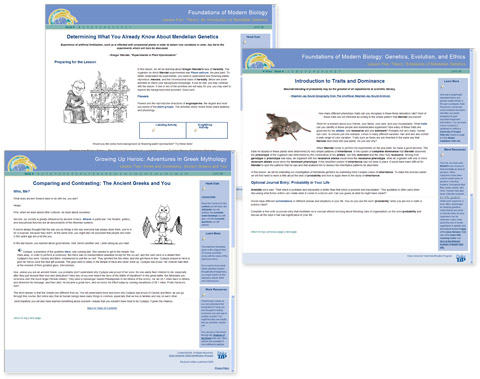Duke University TIP
SoftChalk gets students engaged visually and kinesthetically, allowing them to interact with content and build skills in meaningful ways. As educators, we can harness the quizpoppers and activities to provide immediate, real-time feedback; convert long pages of text into powerful slide show movies with voiceovers; and hyperlink to educational sites for challenging Web Quests. We can link our handouts to require critical thinking and thoughtful responses. SoftChalk is our go-to software to transform lessons into interactive experiences.”
Lyn Hawks, Coordinator of Independent Learning, Duke University Talent Identification Program
Since 1980, the Duke University Talent Identification Program (Duke TIP) has identified and nurtured academically gifted students grades four through 12, serving more than two million students through residential experiences, advanced test-taking opportunities, online courses, and independent study materials. Today, Duke TIP uses SoftChalk extensively in the development of independent study curriculum and online courses, harnessing an interactive, online format that appeals to gifted students in a variety of environments including regular classrooms, resource settings, home schooling and personal enrichment.
Duke University TIP’s curriculum developers have successfully used SoftChalk as a tool to incorporate Bloom’s Taxonomy in CD and online lessons. Bloom’s Taxonomy, published in 1956, was developed by “A Committee of College and University Examiners” led by Benjamin S. Bloom of the University of Chicago. The committee’s goal was to provide a means of classifying learning goals and communicating accurately the expected outcomes of learning. The purpose of the Taxonomy is to enable teachers, those who write curriculum, and those who develop tests to evaluate learning and to classify student behaviors as outcomes of learning in six distinct levels.

The six levels (knowledge, comprehension, application, analysis, synthesis and evaluation) are increasingly complex. In an educational setting driven by standardized testing, learning activities may only take place at the knowledge and comprehension levels without addressing higher realms of the taxonomy. Challenging curriculum must nurture higher-order thinking to maximize student learning, and many gifted students come to learning ready to quickly develop analytical, evaluative and synthesis skills. SoftChalk’s features help Duke TIP’s curriculum designers address this need in a rigorous, engaging suite of lessons for students.
As Duke TIP creates an independent study course, this question drives development: “How can we help students apply, analyze, create or evaluate?” SoftChalk makes it simple for educators to add hyperlinked handouts with problem sets, essays and projects demanding higher-level thinking skills as well as rigorous rubrics for assessment. SoftChalk also allows linking to appropriate educational Web sites where students can “Web Quest” through challenging material requiring critical scrutiny. Other SoftChalk elements allow developers to meet gifted students’ needs at their readiness level, interest and pace: for example, textpoppers and quizpoppers allow deeper exploration of material by defining terms, providing real-world examples, linking to deeper Web content and posing reflective or metacognitive questions.
Timelines, slide shows and hot spot activities transform lengthy sections of written or visual content to more interactive pages, encouraging a student to truly engage with complex material. A developer can also insert animated and audio-based slideshows or link to rich Web media in order to convert text to information that can be experienced in visual, auditory and kinesthetic modes. Duke TIP has found SoftChalk an apt fit for its curricular mission to appropriately challenge and excite young learners to master new and rigorous material.
About Duke University TIP
Since 1980, the Duke Talent Identification Program (Duke TIP) has been a world leader in identifying academically talented students and providing innovative programs to support the development of their optimal potential. Often schools do not have the resources and staff to adequately provide for the academic challenges and social and emotional support that gifted children require. Through Duke TIP a whole range of activities and programs are accessible to parents and teachers to meet the individual needs of gifted children.
